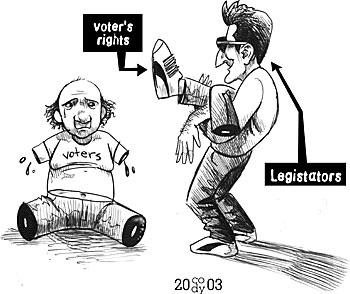
Illustration by Cody Angell
|
By Kendrick Wilson
Arizona Daily Wildcat
Tuesday February 18, 2003
So much for breathing easily ÷ the Arizona state Legislature is back to work. Forget their rejection of Gov. Napolitano's sensible budget, and their recommendation for even more cuts to the state's universities, which would run deep into the bone; now they're trying to take away your voting rights, one bill at a time.
The initiative process that allowed Arizona voters to approve tobacco taxes, save Indian gaming, ban cockfighting, create the Arizona Clean Elections Commission, use lottery money to preserve the environment, and create the Healthy Arizona plan to expand health care coverage to thousands of Arizonans, is under attack.
The State House Judiciary Committee approved two measures last week that could throw roadblocks in front of initiatives. One would move back the deadline to have petitions submitted to the state from July to April. The second would require that a certain percentage of signatures come from at least five different counties. Under the current system, the only requirement is that the signatures come from people registered to vote in Arizona.
If the full Legislature approves these changes, voters will have to approve them in the 2004 election to have them take effect. Voters would do well to soundly defeat both measures, which serve only to take away their voting rights.
One must ask why the Legislature would spend so much time and energy restricting initiatives when our state is facing a billion-dollar deficit and ranks near the bottom of every category dealing with children and health care. The answer is not easy to find.
Have legislators demonstrated that the July deadline does not give the Secretary of State enough time to review signatures for the November ballot? They have not.
Would requiring the signatures to be from a variety of counties affect the outcome of a public vote? It would not.
Would requiring a certain percentage of signatures to come from at least five counties reduce the number of invalid signatures on petitions? It would not.
All these measures could hope to do is reduce the ability of voters and concerned citizens to get initiatives on the ballot. And the Legislature has every reason to keep the people from having the final say on issues facing the state.
Arizona suffers from a horrible case of malapportionment. Since our State House and State Senate are made up of members from the same districts (two from each district to the House and one from each district to the Senate), the districts themselves dictate which parts of the state will have representation. The rural agricultural areas of the state and the greater Phoenix area are both over-represented. The big loser is always Pima County, which just lost two legislative districts in the last reapportionment following the 2000 census.
When the voters in Tucson and Pima County are able to have a say, quite progressive propositions can pass in an otherwise non-progressive state. In fact, Pima County gave the extra votes necessary to pass initiatives safeguarding Indian gaming, improving health care, and moving forward with campaign finance reform. The Legislature is anxious to take away Pima County voters' influence in state government.
The rural agricultural legislators are also anxious to pull the floor out from under Arizona's environmentalists. Since environmentalists in Arizona are often grassroots campaigns without deep pockets, they will be hurt the most. Sandy Bahr of the Grand Canyon Chapter of the Sierra Club was quoted in Friday's Arizona Daily Star as saying "the only measures that will make the ballot would be those pushed by organizations with significant amounts of money to hire paid circulators."
Initiative propositions, once they make the ballot, are far from perfect. Indeed, developers had no problem confusing voters over a 2000 proposal to change land-use policy and place growth boundaries on Arizona cities. Voters ended up defeating a proposal that nearly 70 percent said they favored in polls before the 3.5 million dollar campaign by developers took off.
Imperfect as they are, initiative petitions are the only way of giving the people the final say over important issues facing our state and correcting malapportionment. Interestingly enough, legislators aren't considering restricting their own ability to submit propositions to voters. All Arizonans must stand up for their voting rights and oppose this self-serving proposal by our Legislature.

